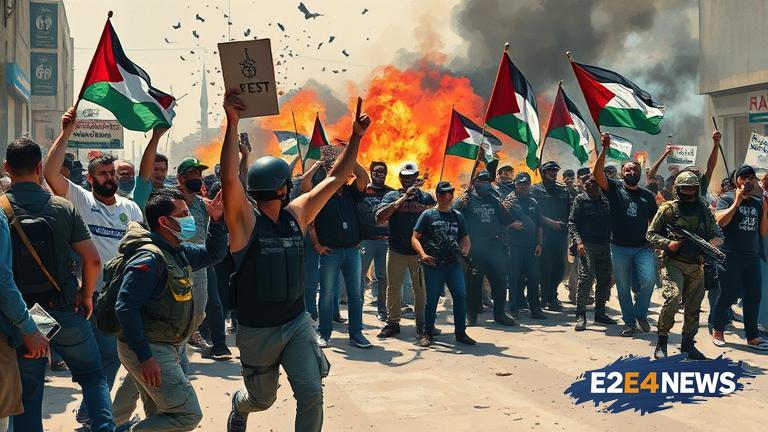The Israel-Gaza conflict has escalated in recent days, with protesters in Israel demanding the release of hostages held by Hamas. The protests come as Gaza strikes have killed at least 16 people, with hospitals in the region struggling to cope with the influx of wounded civilians. The Israeli military has launched a series of airstrikes against Hamas targets in Gaza, in response to rocket attacks from the Palestinian territory. The situation on the ground is dire, with many civilians caught in the crossfire. Hospitals in Gaza are reporting severe shortages of medical supplies, including blood and antibiotics. The Israeli government has vowed to continue its military campaign against Hamas, despite international calls for a ceasefire. The United States has expressed support for Israel’s right to self-defense, while also urging restraint. The European Union has called for an immediate ceasefire and a return to negotiations. The conflict has sparked widespread protests in Israel, with demonstrators calling for the release of hostages held by Hamas. The hostages, including several Israeli civilians and soldiers, were taken captive during a recent incursion by Hamas militants into Israeli territory. The Israeli government has refused to negotiate with Hamas, citing the group’s designation as a terrorist organization. The conflict has also sparked a wave of solidarity protests around the world, with demonstrators calling for an end to the violence and a lasting peace agreement. The international community is increasingly concerned about the humanitarian situation in Gaza, with many civilians facing severe shortages of food, water, and medical care. The United Nations has warned of a potential humanitarian catastrophe, unless a ceasefire is agreed upon soon. The Israeli military has denied allegations of war crimes, despite evidence of civilian casualties and damage to infrastructure. The conflict has also had a significant impact on the regional economy, with trade and tourism severely disrupted. The Israeli government has imposed a blockade on Gaza, restricting the flow of goods and people into and out of the territory. The blockade has had a devastating impact on the local economy, with many businesses forced to close due to lack of supplies. The conflict has also sparked a wave of anti-Israeli sentiment around the world, with many people criticizing the Israeli government’s actions as disproportionate and excessive. Despite the challenges, there are still hopes for a peaceful resolution to the conflict, with many diplomats and leaders calling for a return to negotiations. The international community is urging both sides to exercise restraint and to work towards a lasting peace agreement. The conflict is a reminder of the need for a comprehensive and sustainable peace agreement, one that addresses the underlying issues and concerns of all parties involved. The situation remains volatile, with the potential for further escalation and violence. The world is watching with bated breath, as the conflict continues to unfold. The need for a peaceful resolution has never been more urgent, as the people of Israel and Gaza suffer the consequences of this devastating conflict.
